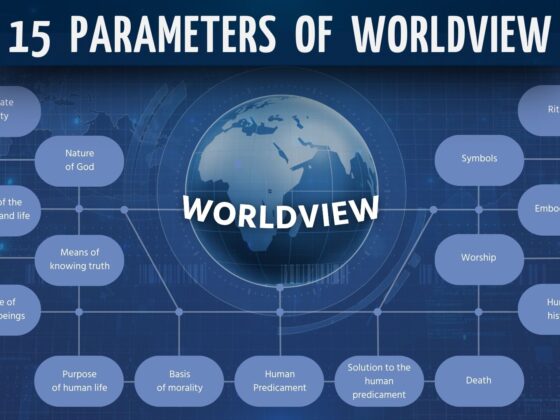Shaping Biblical Worldviews: Addressing the Human Predicament in Education
March 18, 2025
Understanding the Source of Problems in the World
In our increasingly complex world, students face countless challenges that reflect deeper struggles within humanity itself. We often see issues—like dishonesty, broken relationships, and even environmental damage—that stem from beliefs about human nature. If we hope to guide students toward a biblical worldview, we must first correctly identify the root causes of these problems and how they influence our approach to teaching.
Assessing biblical worldview maturity in students is essential for educators aiming to foster thoughtful, Christ-centered individuals. Without an understanding of where students stand in their faith, educators may overlook vital opportunities to guide students toward seeing the world through a biblical lens.
Biblical worldview assessment tools, like the 3-Dimensional Worldview Survey, can help educators identify beliefs, attitudes, and behaviors in students that may hinder or enhance spiritual growth. These tools provide a structured way to foster deeper discussions, empowering students to navigate today’s world with confidence and faith.
Note: This article is part eight in a 15-part series about the parameters of a worldview. You’ll find links to the other articles at the end of this blog post as they become available. If you haven’t read the previous worldview parameter articles, start with part 1 here: Ultimate reality.
Biblical Insights into the Human Predicament
The Bible offers a clear understanding of why the world faces these problems. In Genesis 3:6-7, we see the introduction of sin as Adam and Eve choose disobedience, introducing consequences that ripple through every part of life. Sin doesn’t just harm individuals; it creates a divide between God and humanity. Romans 3:23 further emphasizes that all have sinned and fall short of God’s glory. This inherent tendency towards sin affects the way we interact with the world around us.
The Bible describes the heart’s role in producing sin. Jeremiah 17:9 warns that “the heart is deceitful above all things and beyond cure,” reminding us that sin’s source isn’t just external; it comes from within. Similarly, in Matthew 15:19, Jesus explains that “out of the heart come evil thoughts,” underlining the need for a change of heart, not just a change in behavior. Ephesians 2:1-3 clarifies that without God, we are spiritually dead, alienated from Him and bound to sin’s power. This truth guides the way we approach education, encouraging us to integrate biblical values that can address the heart’s condition and not just surface behaviors.
Comparing Worldview Perspectives on the Human Predicament
The human predicament—the brokenness, suffering, and challenges that individuals and societies face—can be understood in various ways depending on one’s worldview. Different belief systems offer distinct explanations for the causes of these problems and the solutions they propose. By examining several of these perspectives, we can better understand how they shape attitudes, behaviors, and approaches to education. A biblical worldview offers one answer, but it’s important to explore how other worldviews—such as Naturalism, Pantheism, and New Age beliefs—offer alternative explanations for the human condition and the path forward.
Naturalism / Secular Humanism: A Focus on Systems and Progress
Naturalism, or Secular Humanism, asserts that human problems primarily stem from ignorance, bad laws, or ineffective government systems. This worldview suggests that societal issues can be solved through better education, advancements in science and technology, just laws, and competent governance. It assumes that human progress, driven by knowledge and cooperation, will ultimately solve the world’s challenges. However, this perspective overlooks the spiritual dimension of humanity and the deeper root causes of the human predicament—such as the inherent sinful nature of people that no amount of education or system reform can fully address.
Pantheism / New Age: Inner Enlightenment and Self-Redemption
Pantheism, or New Age beliefs, posits that the problems humanity faces arise from a lack of understanding or awareness of our inner potential and the supernatural forces around us. According to this worldview, spiritual growth and societal improvement occur when individuals undergo a shift in consciousness, achieving a deeper connection with the universe and themselves. Environmental care is often emphasized as a natural extension of this consciousness, yet the focus is on self-redemption and internal enlightenment rather than outward, tangible actions or a higher divine purpose. This worldview tends to neglect the need for a redemptive relationship with God and ignores the foundational role that sin plays in human suffering.
Biblical Christianity: Redemption Through Christ
In contrast, a biblical worldview identifies the human predicament as rooted in sin—a rebellion against God’s design. The Bible teaches that all humanity has fallen short of God’s glory (Romans 3:23) and is separated from Him due to sin. This rebellion results in suffering and brokenness in every area of life, from personal relationships to the environment. True peace and fulfillment, according to biblical Christianity, are found only through faith in Jesus Christ, who offers redemption and reconciliation with God. This worldview emphasizes spiritual rebirth, leading to loving obedience to God, proper self-understanding, and responsible care for the earth. It recognizes the need for divine intervention and guidance in addressing the root causes of human struggles, offering a path forward based on aligning with God’s will.
Implications of These Worldviews on Education
Students’ beliefs impact their actions and decisions. Understanding their worldview enables educators to identify how these beliefs shape daily interactions and moral choices. For educators committed to integrating biblical principles, this knowledge becomes a powerful tool in shaping students’ character and decision-making.
Teachers have a unique role in guiding students toward truth by integrating biblical insights into their curriculum and interactions. Instead of merely managing behaviors, they nurture students’ understanding of why these behaviors matter. In doing so, they not only address surface-level actions but also connect students’ actions to their beliefs and heart orientation.
Practical Steps to Assess and Nurture Biblical Worldview Maturity
Assessing a student’s worldview isn’t always straightforward. However, tools like the 3-Dimensional Worldview Survey provide structured assessments that measure students’ beliefs, behaviors, and attitudes. A simple way to start these conversations is by using the 10-question PDF resource designed to help educators understand students’ worldviews in a manageable format.
In classroom settings, educators can introduce these questions in discussions, encouraging students to reflect and articulate their views. This approach allows students to explore how their faith influences daily life, fostering self-awareness and critical thinking. Using the PDF as a discussion guide enables teachers to integrate worldview exploration into their existing curriculum, reinforcing biblical perspectives in a natural, conversational manner.
Conclusion: Identifying the Human Predicament in Education
When we help students understand the world’s brokenness through a biblical lens, we equip them with a framework that empowers them to respond with grace, truth, and wisdom. Developing a biblical worldview prepares them for the challenges they’ll face, giving them a foundation built on faith in Christ. As 1 Corinthians 3:11 reminds us, “no one can lay any foundation other than the one already laid, which is Jesus Christ.”
Nurturing a biblical worldview not only influences students’ current perspectives but also shapes their long-term approach to life. A 3-dimensional, biblical worldview cultivates in students a firm foundation of beliefs, a commitment to living out these beliefs, and a heart oriented toward Christ.
Next Steps
To further support you in this mission, consider downloading the 10-Question PDF, a practical tool designed to help educators evaluate students’ worldviews effectively. Additionally, the 3-Dimensional Worldview Survey offers a structured, insightful way to track and enhance worldview development in your school.
For those ready to explore more, we invite you to take the next step:
If you’re seeking further support, check out our mini-course on utilizing the 3DWS to its fullest potential. Together, let’s shape a generation grounded in faith, equipped to navigate the complexities of today’s world with a clear biblical worldview.
- What Is the 3-D Worldview Survey?
- Take the 3-D Worldview for yourself
If you haven’t yet used the 3DWS with your class, check out the 10 questions PDF below to get started.
3 Key Takeaways
- Worldview Shapes Understanding of the Human Predicament: Different worldviews, including Naturalism, Pantheism, and Biblical Christianity, offer distinct explanations for why the world faces challenges and how to address them. Recognizing these perspectives helps educators better understand how students view and respond to the world around them.
- Biblical Christianity Offers a Spiritual Solution: Unlike secular or New Age views that focus on external systems or inner enlightenment, a biblical worldview identifies sin as the root of the human predicament and emphasizes the need for spiritual redemption through faith in Jesus Christ as the only path to true restoration and peace.
- Worldview Assessment Can Enhance Education: Understanding students’ worldviews is crucial in shaping their moral choices and actions. Educators can use this awareness to integrate biblical principles into their teaching, helping students align their beliefs with God’s purpose and navigate life’s challenges with faith and wisdom.
#3dworldview #biblicalworldview #assessingworldview
All the Articles in the Worldview Parameter Series – links
- Ultimate reality
- Nature of God
- Origin of the universe and life
- Means of knowing truth
- Nature of human beings
- Purpose of human life
- Basis of morality
- Human predicament (this article)
- Solution to the human predicament
- Death
- Human history
- Worship
- Embodiment
- Symbols
- Rituals





